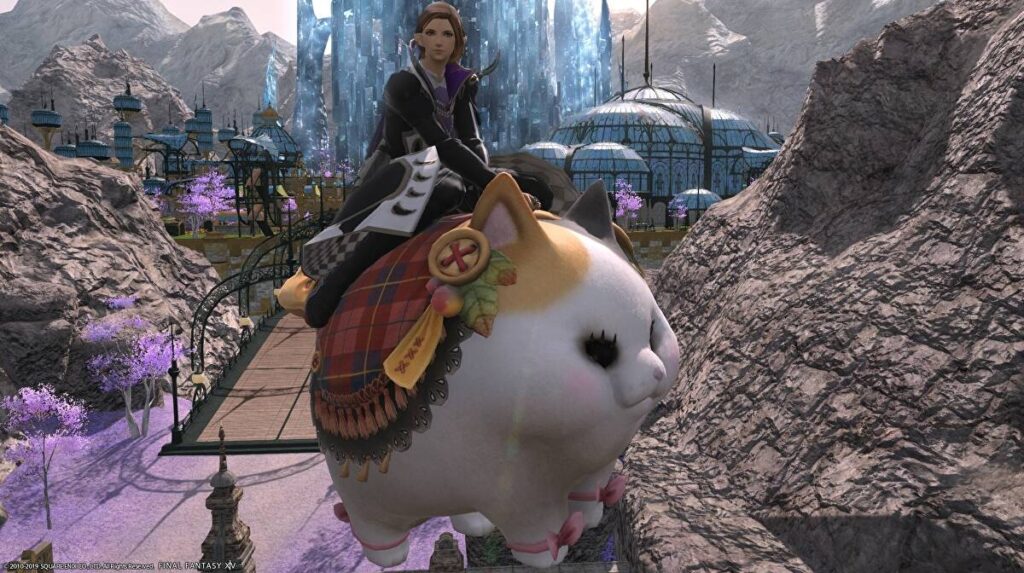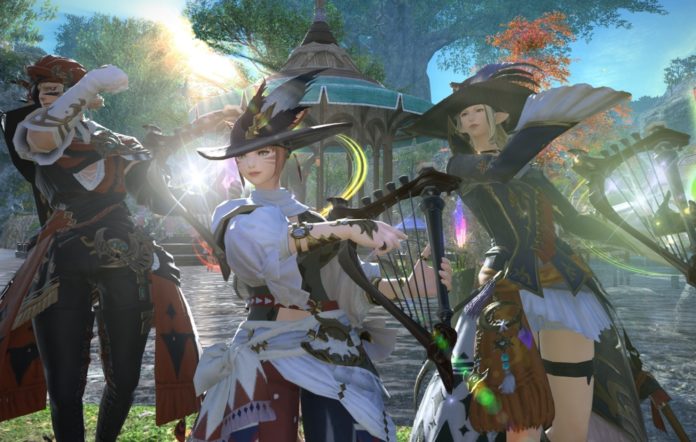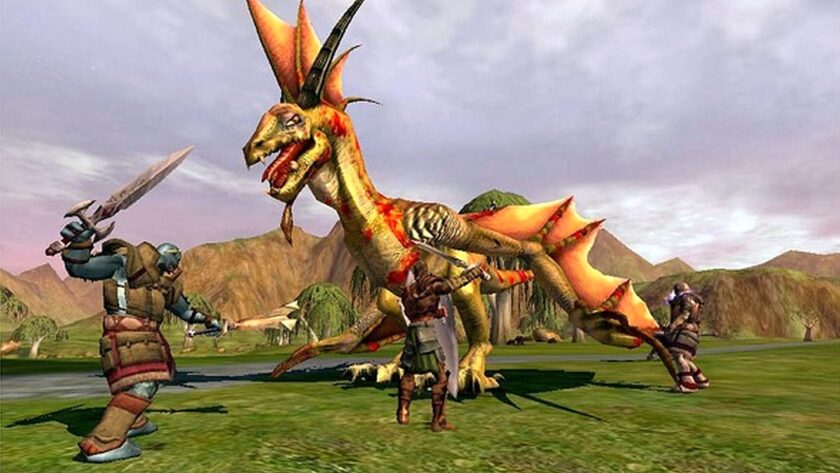MMOs are borked. At least according to games journo Tom Chick. Oh, and that’s right, me too.
In fact, if you’re a regular of this blog, you’ll know that myself (being a regular MMO gamer) and Dave (who isn’t) are both regularly critical of the state of MMOs today. Not to say we’re against the genre, just that the present offerings haven’t advanced the game significantly, and are ultimately based on outdated and, for many, flawed gameplay mechanisms; things like grinding, level progression, theme parks, long travel times etc. Not that upcoming offerings are much different.
So it doesn’t surprise me that others are starting to cry out. It’s time for a change. So, instead of firing another salvo against MMOs today, I’m going to offer some constructive suggestions to improve them.
1) Make the worlds more engaging
MMOs tend to come in one of two flavours: theme park or sandbox. But theme parks, like WoW, have come to the fore in recent years, probably because of the grand success of its exemplar. However, theme parks must be done well in order to be convincing, and WoW does do it well. Others don’t.
In fact, Warhamme Online is an interesting case in point. You’d think Warhammer would have the ideal pretext for a theme park: a world that doesn’t need to change significantly because it’s always in a state of war, and no one side can win outright. But it fails, with many on the forums (myself included) finding the static nature of the world to be hollow and unfulfilling – it doesn’t take long before you really feel as though your character can make virtually no impact on the world. Which is odd, because in WoW you also know you can’t make much impact on the world, but the illusion that you can is more convincing.
However, theme parks aren’t the only way to roll. Sandboxes work. Not for everyone, but there’s definitely a substantial population who want to be a part of a world, influencing it and changing it by their actions. Or just living in it.

That said, theme parks and sandboxes are not exhaustive of the possibilities for an MMO. ‘MMO’ is less of a genre than a technical feature. All an MMO is is a massively multiplayer game. That could strictly speaking be just about anything. You could have an MMO that is basically a lobby for a series of Counter-Strike matches or WWII battles that each feed into a greater strategic plot. You could have a combat game where you fight through a dungeon or labyrinth, and doing so unlocks new options or classes for the next time you run through. An MMO doesn’t need to be an MMORPG, if you get my drift.
2) Ditch classes and levels
This one is a part of a multi-tier rejection of the Dungeons & Dragons mechanic, which somehow has become the gold standard in MMOs. But just pause for a moment and reflect on how ludicrous it is to just stand there taking turns whacking a mob until one of you fall over. It’s not like all MMOs need to be like the Battle of the Somme…
So the first step is to ditch classes. You don’t need to ditch roles, just classes. You also don’t need to ditch character specialisation, just classes.
Classes were a convenient way of describing a role in early wargames and role playing games. In Gary Gygax’s original Chainmail you’d have light foot or heavy foot, which were useful abstractions for distinguishing between a javelin and shield skirmisher and a mailed man at arms. But by having classes like tank, ranged DPS, melee DPS just railroads players into a very narrow path of gameplay. Not all MMOs do this, but most do.
So, allow players to develop a character along mulitple lines. This could be a skills based mechanic, or a customisable power mechanic. And you needn’t lock them in to just one skill set at any one time. Or force them through hoops to respec their abilities. As you can see, there are already MMOs breaking free of the classes thing, but too many perpetuate it (AoC, WAR, I’m looking at you).
And don’t make the game so hard that players need to overspecialise and play their role flawlessly if they’re to survive. Sure, have a hardcore mode for those who want the challenge, but don’t necessititate it.
Finally, don’t make items more important than skills. Certainly items should be important – but more for the extra abilities or specialisations they lend rather than the core stats. Or don’t have items at all. City of Heroes doesn’t, and you don’t hear anyone complaining.
3) Make combat smarter
As mentioned above: stand, whack, fall over is not good enough. Compare Quake to Counter-Strike (or its precursor, Action Quake). In the former the only way to make an enemy more threatening was to up the hit points. But what made the latter so compelling was the sense of danger you had whenever you rounded a corner or entered a room. A single head shot was potentially lethal, which inspired caution – and tension.
Yet in MMOs, you uniformly blast away multiple times to take something down. That’s the Doom mechanic. It’s time for the Counter-Strike mechanic to hit MMOs.
Now, I’m not necessarily saying all MMOs need be twitch games, just that they aren’t battles of attrition. One example mechanic might be reacting to the enemy moves – so when they attack a symbol flashes on screen, and if you click when the symbol appears, you successfully block – or conversely, a symbol appears when there’s an opening in their defences, allowing you to strike for a critical blow. This needn’t be adversely affected by lag, and it can still have skills contributing to your performance, such as by increasing the window when you can click for a heavier blow. And heck, that’s just one mechanic off the top of my head – there must be hundreds more that aren’t swing-swing-swing-dead.
4) Don’t make me grind
Just don’t. I know some people enjoy it. But most of us don’t.
As a point of clarification, challenging, enjoyable combat isn’t a grind. It’s a grind when I’m motivated more by the end result (xp, loot etc) than the experience of the combat.
So, either make the combat more intrinsically entertaining or give me the end result sooner so I don’t have to grind.
I know MMOs want people to play for as long as possible, but making me grind is just lazy. Give me content, or give me entertaining gameplay, or don’t release your game.
5) Make mobs smarter
I can’t beleive I even need to point this out. Mobs in MMOs are bloody idiots. Have we really not progressed one jot in mob AI since Ghosts ‘n Goblins? Yet we’ve becomed so acustomed to seeing a mob 20 metres away in broad daylight and not having it notice us. Or the old chestnut of killing one and having its nearby mates not notice. It’s got to stop.
Make mobs smart. Make them work as a team. Make them unpredictable. Give them special abilities. Make them a challenge.
Just imagine: you turn a corner in the dark dungeon and in the gloom ahead you surprise an orc exiting a side door. For a moment you both pause, staring at each other, waiting for one to make a move. The orc looks at you, looks back in the door from which he came, then makes a break for the room, shouting to rouse his buddies. When you enter the room, they’ve overturned two beds to use for cover while they pelt you with javelins, stones, plates, whatever they can get their hands on. Meanwhile two brutes advance on you, while the more gaunt leader shouts orders from the rear. After a short but vicious battle, the brutes are down and the leader felled by an arrow. At this point the remaining orcs make a break for the door, knocking you down and running for their lives.
That’s not far from Half-Life AI. Why can’t we have that in an MMO?

6) Encourage grouping
There should be absolutely no reason not to group. Groups should earn more xp, get more loot, fight more mobs, have bigger challenges etc. When a group completes one person’s quest, everyone should get the reward as if it was theirs.
In theme parks, this hasn’t worked so well to date, because you might have to run someone else’s quest before you can get to yours. Or you’ll be running every which where to achieve everyone’s objectives. So people tend to solo becasue it’s more efficient xp/min. So I declare fail to that model.
Another way to encourage grouping is give every class a group buff. It could be complementary or contrasting to the role. So tanks could give an auto damage buff or a resistance buff to everyone in the group etc. A group should be more powerful than the sum of its parts – and the mobs should scale to suit. Everybody wins.
7) Quality of life
Don’t make me run for five minutes, let alone 15 minutes – especially over well trodden ground – to get to a quest location/giver. Give me fast transport no more than 10 minutes after I start the game.
Give me a fully flexible and customisable UI with multiple chat windows and quest trackers.
Give me a LFG and an LFM window.
Make the game mechanic transparent. Give me access to the real numbers going on under the hood – don’t hide them away (unless there’s a good reason to keep them secret).
Have everyone auto sidekick to the highest level person in a team or to the team leader.
Let me move servers to play with my buddies. Let me change my name. Let me change my appearance as often as I like. Don’t restrict me doing these things unless you have a very good reason.
Allow me to download the client rather than install from disc. And, for the love of crap, don’t make me have the disc in the drive to play.
8) Make subscriptions cheaper
MMOs are all about critical mass. You want as many people playing as possible. Yet at $15 a month (which becomes $22.50 in Australian dollars), most people will only subscribe to one MMO, maybe two. So, have a low subscription price, and you’ll potentially pick up all those casual players or those who like to play something different from their other MMOs from time to time. As a bonus, your server populations will be higher. And for many of us, teaming is what makes MMOs fun.
9) Listen to, and engage with, players
There are a lot of fanboys and dickheads in the world, and a disproportionate number of them play MMOs, it seems. But developers who foster healthy two way communication with their players will only benefit.
There are pitfalls, to be sure. There’ll always be a vocal minority, and they may not represent the interests of the majority of players. But there’ll also be a lot of keen insights and helpful suggestions on how to improve the game. Listen to them. Given them what they want.
I’ve been struck by the changes to City of Heroes since Cryptic handed it over to NCSoft. It seems the new team have basically decided to give the players what they ask for. So several classes and powersets have received buffs (with very few receiving nerfs), xp gain has been increased, travel powers made more easily acquired at low levels, there’s more customisability and flexibility over powers, and the list goes on. And the game is better for it.
10) Launch when it’s finished
I shouldn’t even have to say this. But an unfinished game should not be launched. If that means developers have to pare back the features to a managable level, do so. But don’t release if it’s not done.
Other articles:
This guide will help you launch an NFT launchpad
The process involved in creating an NFT launchpad
Use these free and paid ways to promote your NFT launchpad project



